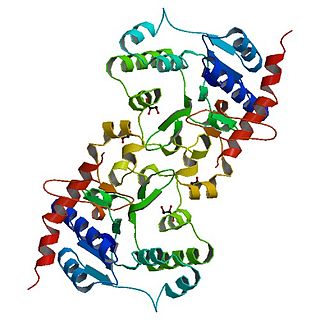| anthocyanidin 3-O-glucosyltransferase | |||||||||
|---|---|---|---|---|---|---|---|---|---|
| Identifiers | |||||||||
| EC no. | 2.4.1.115 | ||||||||
| CAS no. | 65607-32-1 | ||||||||
| Databases | |||||||||
| IntEnz | IntEnz view | ||||||||
| BRENDA | BRENDA entry | ||||||||
| ExPASy | NiceZyme view | ||||||||
| KEGG | KEGG entry | ||||||||
| MetaCyc | metabolic pathway | ||||||||
| PRIAM | profile | ||||||||
| PDB structures | RCSB PDB PDBe PDBsum | ||||||||
| Gene Ontology | AmiGO / QuickGO | ||||||||
| |||||||||
In enzymology, an anthocyanidin 3-O-glucosyltransferase (EC 2.4.1.115) is an enzyme that catalyzes the chemical reaction
- UDP-D-glucose + an anthocyanidin UDP + an anthocyanidin-3-O-beta-D-glucoside
Thus, the two substrates of this enzyme are UDP-D-glucose and anthocyanidin, whereas its two products are UDP and anthocyanidin-3-O-beta-D-glucoside.
This enzyme belongs to the family of glycosyltransferases, specifically the hexosyltransferases. The systematic name of this enzyme class is UDP-D-glucose:anthocyanidin 3-O-beta-D-glucosyltransferase. Other names in common use include uridine diphosphoglucose-anthocyanidin 3-O-glucosyltransferase, UDP-glucose:anthocyanidin/flavonol 3-O-glucosyltransferase, UDP-glucose:cyanidin-3-O-glucosyltransferase, UDP-glucose:anthocyanidin 3-O-D-glucosyltransferase, and 3-GT. This enzyme participates in flavonoid biosynthesis.







